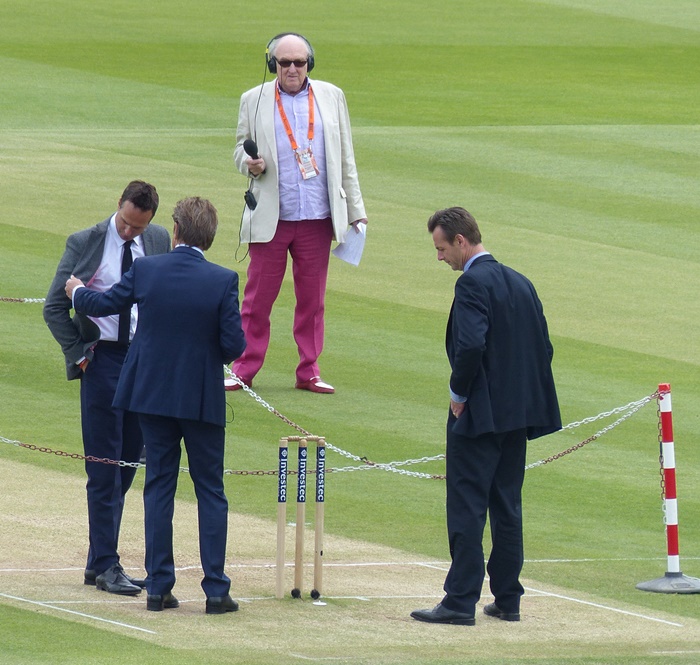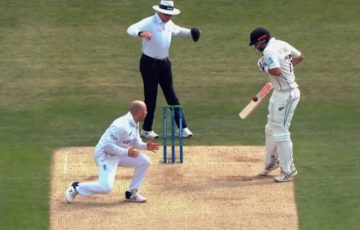
Henry Blofeld, the long-serving Test Match Special commentator with the extraordinary accent and a strong proclivity for getting players’ names wrong, is calling it a day at the end of the season. It’s safe to say we’ve always had mixed feelings about the man.
If we were to try and sum up those feelings, we’d say that we like the idea of there being a commentator who works in a similar way to Blowers – we’d just maybe prefer it if that person wasn’t Blowers himself.
“A lot of our audience are people doing housework wanting a comfortable voice,” he said, announcing his decision to stand down. “I talk about pigeons, seagulls, policemen and the girl in the red dress in the grandstand. It’s all that, I think, which attracts people along with the cricket.”
You may think that. But not everyone will entirely agree.
If you’re trying to follow a match, this kind of thing is not always endearing. Sometimes it’s just irritating and maybe even a bit embarrassing – but then at times Blowers becomes such a self parody that it actually becomes endearing again.
It’s a tricky one and no mistake.
The issue, as we see it, is this. Test cricket ebbs and flows and commentary must ebb and flow with it. There are definitely times for talking about irrelevant bollocks, but there are also times where you need to focus on the action.
Blofeld isn’t bad at conveying excitement and he certainly understands cricket. He does however seem to have been taking less and less of an interest in touring players and what they might have achieved outside of the English summer.
Maybe you think that’s unfair, but we can’t really recall him saying anything about a player that we didn’t already know. Getting people’s names wrong can also derail things when listeners are trying to follow a crucial passage of play.
That said, we’re not delighted about Blowers’ departure, as we perhaps would have been a few years back. There was a period when the narrow array of TMS accents made us embarrassed to listen to cricket in the back garden as it sounded like coverage of some niche upper-class pursuit.
Nowt wrong with a plummy accent, but there was a lack of diversity in the commentary box for a while there. As someone who is essentially a cricket evangelist, this frustrated us enormously as it reinforced a widely held perception of the game that we have always thought unfair.
TMS accents are less of an issue these days and it’s pleasing to see that the programme’s commitment to diversity belatedly extends to gender too. Maybe at some point soon they’ll feel there’s a significant gap and find themselves actively seeking out a rambling Old Etonian to put in the occasional shift.


I’ve always liked him on the whole although in the last few years and with the advent of twitter particularly he seemed to become an extraordinary parody of himself. I don’t think in years gone by he was ever quite as extreme as the Blowers that has been seen in recent years and that older version of him I liked.
Although my main memory of him in the 90’s particularly (and usually when playing the West Indies or Australia) was that his commentary heralded the fall of at least one England wicket. Sadly seemed not to work I reverse.
Henry Blofeld on encountering his first Jaegerbomb – “There appears to be a drink in my drink, old boy!”
Just think about it this way. Less Blowers might well mean more Michael Vaughan. Nobody wants that. Nobody.
Actually find him less annoying in the confines of TMS than on Twitter, where he’s pretty much unbearable.
I find pretty much everybody unbearable on Twitter. Though I don’t know if that is a problem with me, with everybody, or with Twitter.
All of the above!
Most people on Twitter are twits. Even the ones that really aren’t in Real Life.
Most of my thoughts on the matter are trapped in a time-warp on the previous thread – a critical error of timing, played at the ball too early, before it was even delivered! However…
I will miss Blowers. I will miss the awesome voice and the memorable personality and generally feel an absence in the commentary box, the same way I feel about CMJ. I can appreciate he is not everyone’s cup of tea, it would be nice to have less slips and self-parody, and even the great man himself recognises it is time to move on. Being brutally honest, perhaps it was time a long while ago, but nostalgia is my inalienable right as an Englishman, so I will miss him regardless.
What I’m worried I will miss more, is the style, ethos and philosophy of commenting that he represents. Oddly I’ve found that the commentary has become more monochrome – I suppose “professionalised” might be a kinder way to put it, but that’s being kinder to it than it deserves – even as the commentary team has become more diverse in accent, class, gender and race. I’m hoping that someone like Tuffers – who has spent a bit more time outside the professional cricket circuit – might try adding a bit more “background colour” to his stints at the microphone.
A lesson for future TMS hiring and firing there: diversity of backgrounds does not necessarily equate to diversity in output.
Yeh, well now that I’ve worked out copying and such stuff, I’m going to do that to your earlier very excellent post. And hopefully with formatting too.
.
I’ll miss him. The ‘Internetisation’ means that there’s never much trouble with following what’s actually going on these days, and even without the Internet there’s usually someone else in the box. Usually one of those people Bert described elsewhere, who know the game inside out but have no idea how to communicate that in an engaging manner.
Blowers was, is, a character. An old posh white male character, maybe, but a character. For someone like myself, who will always prefer cricket the experience to cricket the sport, a character almost always adds to the game rather than taking away from it. Even if the factual side of things might suffer a bit as a result.
We’ve said it here before…
(Just before, in fact. In the post immediately prior to this one, and now that I’ve learned all about copying and pasting, maybe in many more posts to come.)
…but the key thing that all commentators need to do is understand who they are talking to. In the main they are talking to fans, and therefore they should talk like fans, knowledgeable fans, fans with insights, but nonetheless fans.
This doesn’t preclude ex-players from being commentators, but they need to stop talking as if they are still players. Technical details are all well and good if they enhance the discussion, but too many of the current breed of commentator think that’s all there is. In the coaching rooms, every good shot is a bad delivery, every wicket is a poor choice by the batsman, but as a fan I prefer to think of wickets being solely due to bowling brilliance and every boundary the result of sublime, superhuman batting. Commentary these days feels less like seeing the beauty of the painting and more like discussing the selection of the paint.
Blofeld was firmly in my camp, as were Brian Johnston, CMJ, John Arlott, Richie Benaud, and Murray Walker, David Coleman, Ted Lowe, David Vine and a great many others. All these people had vast technical knowledge of their sports, but importantly they knew how and when to use it, and how and when to be just like the rest of us – awestruck observers, but with an ability to put that awe into appropriate words
And just to add, I was also a bit ambivalent about Blofeld. When Johnston and CMJ were at their peak (i.e. alive), I always found Blofeld annoying. It’s only since those two have gone that I have enjoyed listening to him, I guess as just the last representative of that generation.
Same here – for the same nostalgic reasons, I suspect – but although I found him more irritating than endearing, there were still moments of inimitable scene-conjuring that would make me forgive him. And for all the self-parody stuff about buses and cranes, he could also capture a moment of brilliance on the field of play. (Bravo on the formatting, by the way, most impressive.)
Better to hit the highs and also bring troughs than to deliver neither.
Out obstructing the field on review! What a day to be alive.
Used to be ok, has been dire for a very long time. I am pleased that he is going albeit much too late. We may get a competent commentary team at long last. TMF would never have sacked him.
He was not my favourite, but I will miss him. There is more to cricket commentary than an accurate accounting of events on the field.
This does free up space in the ranks for Danny Morrison, though.
Ah, Danny “the worst commentator at the IPL, even worse than Ravi Shastri” Morrison.
I’ll miss Blowers and I think the whole Etonian thing is a gnarly old chestnut and of little consequence to rail about. After all, half the actors on Sunday night telly came out of that stable, but Blowers never came across as preferential. I saw him at one of his talks at a low key event in Soham, Cambs, of all places. He’s genuine, unaffected and the wine that he punts out ain’t half bad. I did, however, think that it would have been good to have had a commentator of similar ilk for Blowers to spar against in the commentary box. The old and the new sometimes did not gel.
I was always ambivalent towards the dear old thing. In later years he seemed to be a Blowers tribute act. Agnew is not bad but in his BBC blog he comes across as insufferably smug. Test match sofa and latterly guerilla cricket despite the amateurishness run rings around TMS.
I heard very little of him. What I did, I liked. He was funny, in this bombastic, idiosyncratic way. Boycott came close but he knew too much. Seagulls, buses and misunderstood, misspelt names are part of playing 5 day cricket.
I will miss Blowers. Not particularly for what he said, but what he represented. A dilettante, in the best sense.